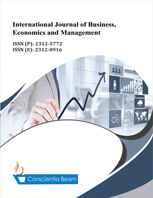Digital Intellectual Dynamics: A Perspective on Performance at a Brazilian E-Commerce Firm
DOI:
https://doi.org/10.18488/62.v9i2.2956Abstract
Using the intellectual capital and dynamic capability literature as known dimensions of organizational performance in digital contexts, this article develops a new testable model that attempts to explain digital intellectual dynamics’ (DID) impact on a Brazilian e-commerce firm’s performance. Using a quantitative methodological approach, an inedited instrument of research is used to gather data from 77 managers, and, through exploratory factor analysis (EFA), a replicability analysis (generalized H (G-H) index) is conducted along with quality and effectiveness assessment through factor score validation in Factor 10 software. Structure Equation Modelling (SEM) is used to test the hypotheses. The results reveal that DID, as a second-order variable, and Digital Human Dynamics and Digital Social Dynamics, as first-order variables, are positively related to firm performance. Digital Structure Dynamics, another first-order variable, has a positive effect on firm performance but not at a statistically significant level. This empirical result brings visibility to the role of DID in firms’ performance, creating a strategic perspective for a firm’s management in digital contexts. Furthermore, digital information systems (DIS) researchers may view these results as a response to digital disruption and a reinvention of core functions in a new strategic approach to support e-commerce transactions and firm performance. On a methodological level, the use of EFA introduces new indexes to measure this innovative instrument, as it is the first time it is used in social science research. Practitioners may use these results to enhance their firm’s performance through DID.

